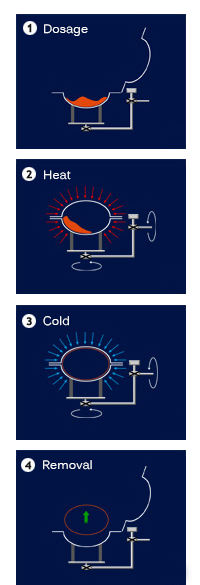Rotational moulding
In rotational moulding, the mould is charged with a specific amount of polyethylene powder, which is then heated and rotated on two planes at right angles to each other. This disperses the powder onto the inner surface of the mould, where it melts to form an even layer of the desired thickness. The normal oven temperature is 200-400°C. The hot air from the oven heats up the mould so that the polyethylene powder melts into a homogenous layer on the walls of the mould. After this process, the mould is cooled in a cooling chamber and then emptied before the product goes through its final finishing. The moulding cycle varies from roughly 15 to 45 minutes, depending on the thickness and size of the product, the oven temperature, the plastic material being used and the material used for the mould.
The moulded products are stress-free, since they are manufactured in a pressureless process. Multi-holed products with wall thicknesses of up to 15 mm and a volume of around 20,000 litres can be moulded in our large rotational oven. A relatively large variation in wall thickness, from one part of the moulded product to another, is possible as long as the transitions are gradual.
When manufacturing a range of different products, rotational moulding is well able to compete with manufacturing processes such as blow moulding, injection moulding and vacuum forming. Most people in the market are aware that the rotational moulding method, with all its advantages, provides greater flexibility when it comes to rapid development and adapting products to specific requirements. The mould used in the rotational process is made from steel plate or aluminium, and costs only a fraction of the moulds for blow moulding or injection moulding. For small production runs in particular, the rotational moulding method is more economical than any other method.

Benefits of the method
Wall thickness and weight can be controlled through the specific amount of polyethylene powder added to the mould.
A certain amount of freedom is allowable when it comes to the melting index and density of polyethylene powder.
Good dimensional accuracy.
Highly complex Products can be moulded.
Rotational moulded Products are practically stress-free, with no joints.
Products based on polyethylene are eco-aware with a long life , they are also resistant to heat and cold, chemical resistant and resilient to impact.
Solutions
Double walled constructions – Foam filled constructions
Design flexibility – Individual colours for the products
Threads and engraving, ect. can be added at the rotational moulding phase.